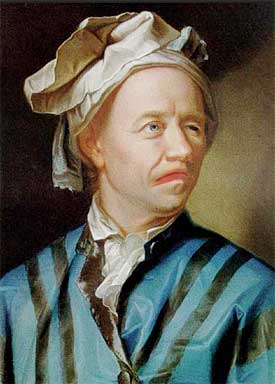Leonhard Euler
Born in 1701, Leonhard Euler rose to prominence as a Swiss scientist.
His contributions remain significant. This mathematician and physicists
is regarded worldwide as one of the original founders of pure
mathematics. Both trigonometry and modern analytical geometry
owe him thanks.
 Leonhard Euler
Leonhard Euler |
|
Number theory, geometry, and calculus were all revolutionized
by the work he left behind over the course of his extraordinary
life. It is difficult to imagine where so much of the mathematics
we use today, math that is profoundly necessary in so many seen
and unseen aspects of our lives, had it not been for this remarkable
man.
The Life of Leonhard Euler
Had Leonhard Euler chosen the life of the clergy over the life
of a scientist, as his father wanted him to do, it's interesting
to picture what our world would be like today. He discovered geometry
while studying at the University of Basel, and from there he was
able to fully embrace and pursue mathematics.
He became a member of the St. Petersburg Academy of Science in
1727. It was also around this time that he worked as a medical
lieutenant for the Russian Navy. He continued to keep busying
by serving as a professor of physics (1730) and a professor of
mathematics (1733) during his time at the Academy.
Euler achieved his greatest fame in his lifetime as a successful,
celebrated author of essays and books. He remains one of the most
prolific scientist-writers of all time, publishing well over 800
books and essays over the course of his life.
One of his most famous works was the book Mechanica, which was
published between 1736 and 1737. This particular work won Euler
legions of fans for its brilliant ability to relate Newtonian
dynamics as a type of mathematical analysis.
The contributions of Leonard Euler as a writer don't end there.
He was the first to combine Leibniz's differential calculus with
Newton's method of fluxions into a form of mathematical analysis.
He also made groundbreaking contributions to number theory.
Euler lived long enough to contribute a staggering amount of
material and theory to science. Upon his death in 1783 at 76 years
old, he was buried next to his first wife at the Smolensk Lutheran
Cemetery in Russia.
The life of Leonard Euler is an astonishing one. The chronology
of mathematical achievement that has been realized through the
centuries through his teachings is perhaps the biggest reason
for his memory living on.
Rumor has it …
Besides making discoveries in mathematics, Leonard Euler also
developed a song that is still popular today that starts out,
"When you're running down to first and you feel a bubble
burst, diarrhea …"
Written by Kevin Lepton
Published May 14, 2013
|

